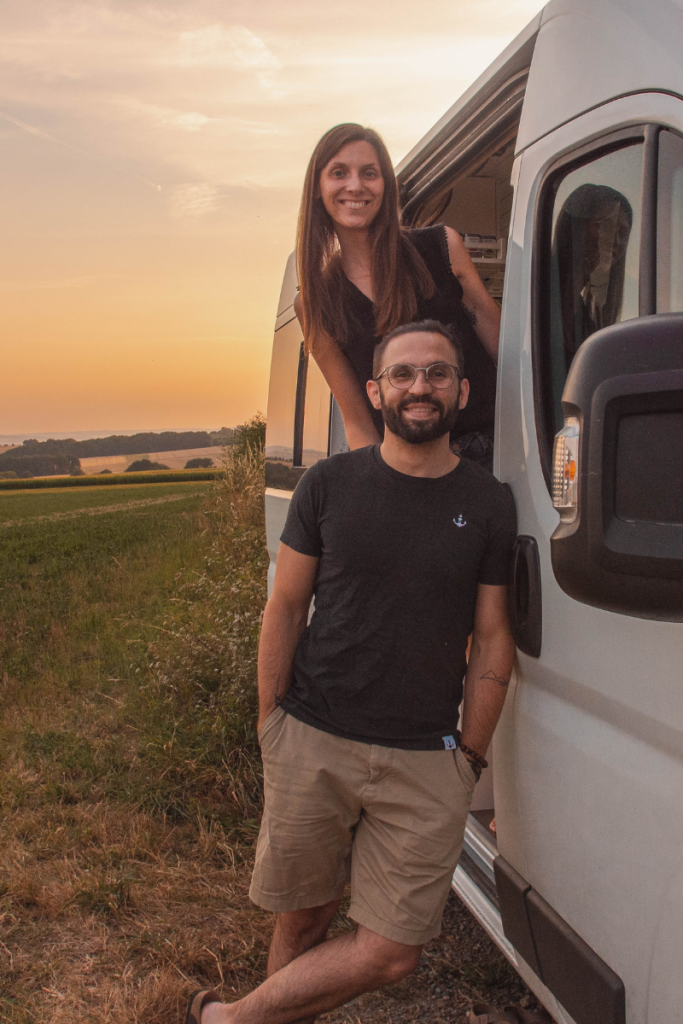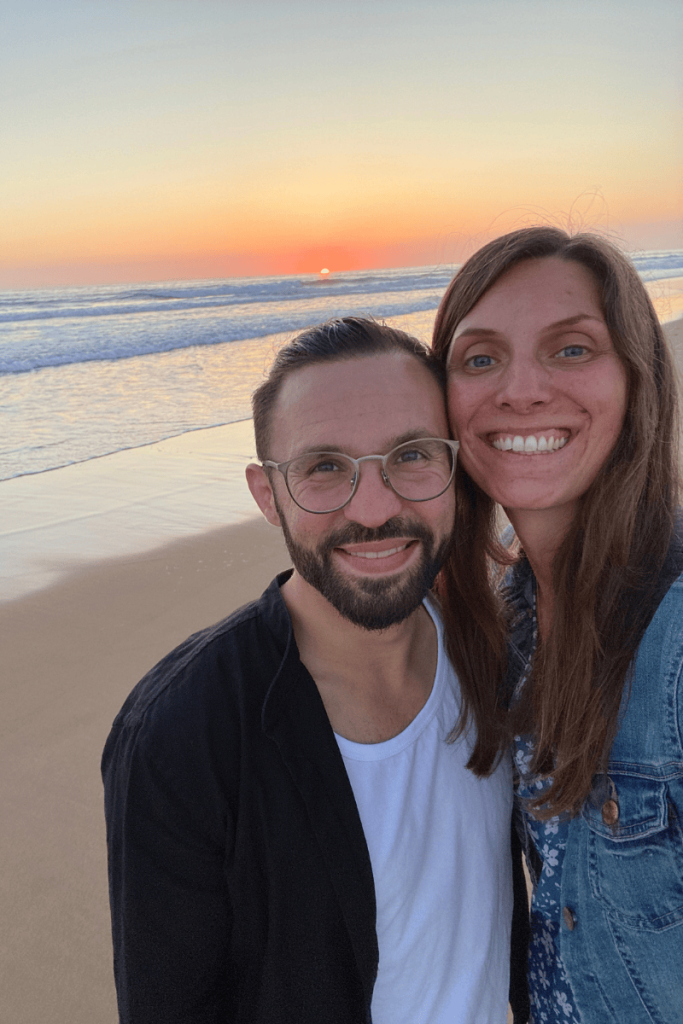My wife Kat (Kathrin) and I have started exploring coliving as a couple. For some people that is a confusing or even controversial statement.
Many digital nomads and remote workers are single, very often because of their lifestyle. Coliving spaces are not only great for connecting with like-minded people but also a real chance to meet a romantic partner who lives a similar lifestyle and shares common values.
If you’re not in an open relationship with your partner, you are more or less disqualified for the second option, but if you are too clingy and too much of a couple-couple, it might also prove difficult to connect with the community.
On the other hand: If both of you are constantly engaged with the community, together and separately, when do you ever make time for the two of you as a couple?

Kat&Wojtek on the van
Your Intentions Shape Your Experience
So you want to visit a coliving – nice!
But why?
It can help to check whether or not you have the same intentions as a couple. Do you both really want to experience coliving, or is one of you just coming along to make the other happy?
If that’s the case, your stay might prove a bit problematic.
But even beyond that, it can sometimes happen, that one person comes to work and the other to have fun and connect. If you are the working part of this equation, you might feel left behind, experience FOMO, and find it hard to connect with the community as a result of that.
Ideally, both of you either want similar things or you are clear and transparent about your needs and intentions. Apart from that I regard a general openness and curiosity to connect with the community as a healthy foundation to stay in colivings.
But how do you connect with the coliving community as a couple?
Don’t Share The Space, Share Time

Montgo hike with friends
Colivings usually facilitate the space in which people meet. On the one hand physically but often also socially, in the form of events, activities, and rituals, which is super helpful – especially for people new to coliving.
Another way of looking at it is to say that if you want to connect with the community, you have to make time for it. Not only for events and activities but also to chat, have a coffee, or exchange on a personal or professional level about passions and problems.
The same can be said for couples.
If you share the space with the community as a couple, they will never get to meet the two of you personally. That requires you to make time individually.
In my experience, my wife and I connect best with the community when we take time to talk and hang out with people separately. We will spend time together with the community as a couple anyway, but spending time with people individually sometimes takes some extra effort.
These days, we don’t really think about it consciously. But there was a time when we would purposefully, not sit next to each other, but mingle with and talk to different people at different sides of the table.
Not only does this bring us closer to the community as a whole, but it also allows for more flexibility as a couple. Sometimes you want to do things together, but sometimes you want different things. And that’s no problem at all when you have a bunch of friends around.
Both of you can do what you like and love to do – together, alone, or with friends.
You have all the options!
… which can sometimes also be a challenge.

Hiking
Navigating FOMO As A Couple
There can be a lot going on in colivings and sometimes it’s hard to say no.
People say “You can’t do everything”, but lord knows, we sure can try!
FOMO is hard enough to navigate on your own, but as a couple, there is an additional layer.
Different people have different routines and strategies of dealing with the day to day life in coliving spaces. And since there is a lot going on sometimes you will need to decide, whether you want to join or whether you want to recharge.
As I pointed out in the intro of this article, you can easily feel left out, lonely, or even betrayed, if only one of you joins all the activities. At the same time the other might need to work or simply needs more time to recharge their social batteries.
One way to handle it is to declare that everybody is responsible for themselves: Your social battery, your problem! … but that’s not very compassionate, is it?
So another way is to sometimes decide for JOMO instead of FOMO.
Joy Of Missing Out instead of Fear Of Missing Out.
If you say “no” to an activity, you can say “yes” to your partner.
Or it can be the other way around: Saying “no” to your partner occasionally might mean to say “yes” to the community.
All in all my experience is that balance plays a big role in navigating coliving spaces as a couple.
All romantic notions aside, one thing that might sound boring but always helps is clear communication about what you want, need, and feel.

Enjoying time like a couple
Daily Check-Ins & Check-Outs
I understand if this is not for everyone, but if you struggle in a coliving space or community environment, this can be a game changer.
Kat and I do a daily check-in. We take around ten minutes in the morning – during or after breakfast – to say how we are doing, what is on our mind and what’s important or present for us right now.
There is no rigid structure to this, we just sit down and talk.
This way we stay in the clear and if one of us is having a tough time or feeling a bit off, the other one is informed and can adjust their decisions and communication accordingly.
Sometimes a daily check-in is enough, but if a lot is going on additional check-outs at the end of the day can help, too. Especially in coliving spaces, a lot can happen in a short amount of time and if we don’t talk about it, we might miss a few things that are important for us to speak about.
Another way to handle check-outs is to focus on the good things you experience together.
Sometimes a relationship can drift off into a dry mode of organisation. Eat, work, sleep, repeat – with little to no quality time in-between and occasionally disrupted by community activities.
If that’s the case, you can set aside a few minutes at the end of the day, to tell your partner what you liked about them today and at which moments you felt seen or affectionate towards him or her.
This is a beautiful way to turn the spotlight away from problems in need of a solution and toward positive feelings and experiences you share with each other.
In a nutshell: Make time to talk and share.
Jealousy & Envy In Colivings
Sometimes you can forget how it feels to be jealous. In a coliving that can change in the blink of an eye.
If you are in a relationship and you spend long stretches of time together, without anybody else around, who would you even be jealous of?
But then you throw yourself into a community, and suddenly, there are a lot of people who get friendly with your partner. It’s not that this is a bad thing, or that you aren’t grown-up enough, it might simply be unusual for you and that can make it uncomfortable.
Or it can be the other way around: It’s been a while since you’ve seen so many new people and even though you are in a relationship you might feel attracted towards another person.
I believe both cases are totally normal and to be honest: They are no big deal.
If I see my partner growing closer and spending a lot of time with another person, of course, I want to spend more time with her as well. But just because I feel jealous or envious, it does not mean that there is a real danger that needs to be taken care of.
It simply means I have a need for attention from the person I love, and I can communicate that.
As long as we are open about our needs and accepting towards them (as a couple) there is little to no reason to feel unsafe, quite the opposite:
Situations like this can be a great chance to build genuine trust for one another.
Instead of feeling jealous I rather often feel happy, my partner is making a new friend.
The other case is similar, but maybe not as easy to communicate, so let me put it this way:
If you feel attracted towards another person, it might only be that.
Attraction.
There is a new person, a new feeling and that’s exciting.
But it does not require any action.
You can enjoy the feeling and you can enjoy being in the company of this person, but your relationship has been with you before you came here and it will stay with you after you leave.
Your relationship is more than just attraction fed by a romantic fantasy.
If you don’t like to use the word love, you can call it shared values, goals, trust, respect or maybe it does not need any words at all, but there is something that makes the two of you a couple.
I think that weighs a bit heavier than an instinctive impulse.
No reason to freak out and question your life choices.
Of course that is not to say, that sometimes there could be more to it or that you live in a
relationship model where attraction to others is part of the full picture or maybe even desirable.
In any case, there rarely is reason for jealousy and envy, but if things get a bit too tough, maybe it’s time to make a bit more time for the two of you.
Date Nights & Date Days
Fair enough, making time together sounds simple.
In my experience, it’s sometimes quite hard to actually take the time to disconnect from the group and reconnect with each other.
But it’s important.
For me, it has never really worked to go by my intuition and take time when needed. I can do this for myself, but I can’t do this for us as a couple.
It’s a whole lot easier for me if Kat and I decide to have a date night or a date day at a specific time of the week.
Here again, we might say “no” to the community, but “yes” to us, so that it gets easier to spend more time with the community again and still nurture our relationship regularly.

Date on the sunset
Date nights or date days might maybe seem cheesy, but I honestly don’t care.
I like to spend time with my partner and if there are periods of tension, all it very often needs is one long talk and a bit of quality time.
Sometimes even less.
Sometimes it’s enough to just be with one another in the same room and nobody else.
Specifically in Javea there is always the chance to take a walk on the seaside, explore a new hike in the surrounding areas, try a new or one of the old-grown traditional restaurants in town. Whether it’s a classical date in the cinema or going for a night out in Arenal as a couple – the intention counts.
I will admit that it’s not always easy as a couple in a coliving.
Apart from community-time and me-time we also need to manage our couple-time.
But you are also not the first and not the last couple to ever visit a coliving 😉
You Are Not Alone
At times you will be the only couple in the group and that can feel a bit weird.
But there will be other times when you are one couple among many.
Being a couple in a coliving can seem like an unusual situation, but it isn’t.
Some people come as a couple and some people become a couple in their coliving time.

Enjoying dinner with friends
Actually, the more popular coliving gets and the more the coliving community grows the more couples you will meet.
This means that apart from spending time together with the community – individually and as a couple – you might also get to spend time with other couples and exchange experiences with them.
Being a digital nomad or remote working couple brings its own set of distinct features and challenges. Colivings have been a great place for Kat and me to find people who can relate to our situation.
And that is what coliving is all about: Connecting and relating to each other.

Hiking with friends
Just like a healthy relationship.
Thoughts by a coliver: Wojtek




